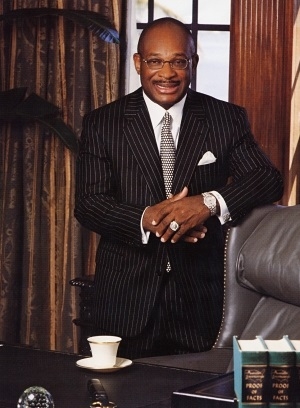Willie Edward Gary
Class of 1999
- Senior Partner Gary, Williams, Parenti, Finney, Lewis, McManus, Watson & Sperando

Tough times don't last, but tough people do.
Willie Gary's parents were sharecroppers in Eastman, Georgia, until his birth in 1947 compelled them to sell out. Gary had a twin who died during their complicated birth, and the ensuing medical bills forced his parents to give up what little they had. Rather than resenting the bad situation the family was put in, Gary's father felt his young son was special. "He told me that God had something in mind for me," Gary says. "He thought that since they had to go through so much to have me, that I would be the one to go out and make a difference."
The Gary family became migrant farmers, following the crops from Florida to the Carolinas, then back to Florida. They picked string beans, sweet corn, sugar cane, potatoes, apples, oranges, and grapefruit. It was a grueling life. They spent hours at a time bent over in temperatures past 100 degrees with insects buzzing and biting. The dust was choking, and the water breaks were few and far between. "You didn't make a fuss about it," says Gary. "Daddy didn't allow us to complain."
The fifth of 11 children, Gary recalls that when his mother gave birth to his younger sister on a Friday, she was back working the fields on Monday. With no permanent home, the family sometimes slept in nothing more than a tent or the occasional shack on the farmer's property. Still, Gary's mother insisted on cleanliness. She told her children, "We may not have much, but we can be clean, we can be neat, and we can be prompt." By the time he was eight, Gary ironed his shirts and pants each day. Often, he had to wear two pairs of pants, carefully lining them up so that each pair covered the holes of the other.
At the age of two, Gary joined the family in the fields. When he was seven, he became the babysitter for his younger siblings until they were old enough to work. As soon as Gary started school, he knew education could be his ticket to a more successful life. "I was hungry for an education," he says. But he couldn't go to school every day. Some weeks his father would tell him that he could attend school on Monday and Friday, but he would have to work the other three days. In the summer, the work in North Carolina lasted until November, two months past the opening of classes.
The system dictated that migrant children, who made up 60 percent of the work force in the fields, would attend school only for half-days. A bus would pick up the children at noon and take them to the fields, where they worked until sundown. The family moved every two months. Just as young Gary began to settle in, it would be time to move on to the next crop. He was beginning to fall farther and farther behind in his studies. Still, he never gave up on his dream to be the first in his family to graduate from high school and go to college.
When Gary was 13, his family settled permanently in Indiantown, Florida; his five oldest siblings remained migrant farmers. Gary had to work hard in school to catch up to his peers. He also began a lawn service that helped support the family throughout his high school years.
Gary played football in high school and began to hope that his skills would be enough to earn him a college scholarship. He attended Shaw University in Raleigh, North Carolina, on a scholarship. During his sophomore year, he married his childhood sweetheart, Gloria Royal, whom he had known since second grade. They had their first child the following year. The Garys lived in a one-room apartment, and the three of them slept in the same bed. Gary continued to play football while going to school, and sold hot dogs and hamburgers at the campus grill until two o'clock every morning. On weekends, Gary tended to his lawn business. Willie and Gloria Gary graduated from college at the same time. She went on to earn a master's degree, and Gary entered North Carolina Central University Law School.
After graduation, Gary could not find a law firm that would hire blacks. Undaunted, he decided to start his own firm. His first case was successful, winning a $250,000 settlement. In fact, Gary went seven years without losing a case and became one of Florida's most successful attorneys.
Gary says his message to Horatio Alger National Scholars is this: "You can be whatever you want to be, but you will never be any more than what you think you can be. You have to make a commitment; you've got to set goals."
